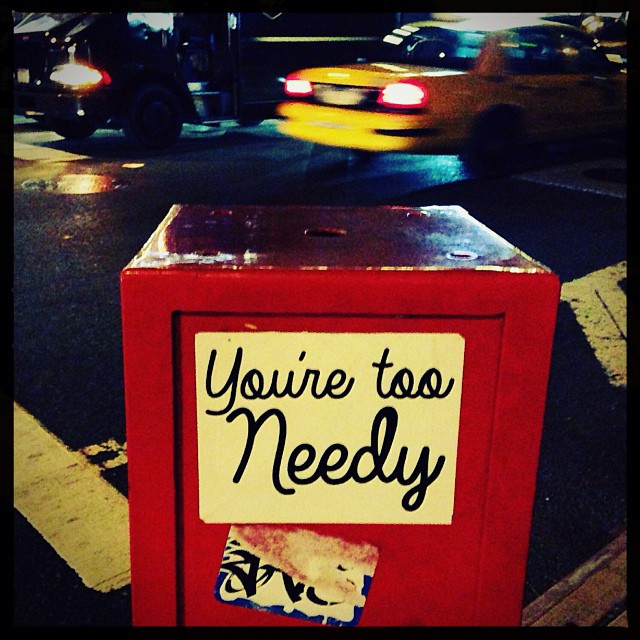Brands should be needed not needy
Needy is a wonderful word to describe someone that craves rather too much of something from us rather too much, whether attention, help, love, sex or friendship.
Someone who is needy exhibits desperation for attention that is inappropriate given the relationship that we have with them. They crave and cling and in short their neediness has the opposite effect to the one they hope – it’s the ultimate turn off in a prospective partner short of a library of comic novels or a porcelain doll collection.
Not one of us likes neediness.
But you wouldn’t guess this from the way that most brands behave. Quite frankly brands are becoming way too needy – desperate for attention they plead with us to like them, chat to them and go back and give them another chance. Even the online games I play send me needy messages telling me that my village, clan or farm is missing me.
In the past the means by which brands communicated with us were both expensive and impersonal. Even if they were desperate to make contact, arrange a date or tell us how much they liked us they couldn’t. There was only so much TV they cold buy or direct mail that they could send.
But boy are they making up for time right now.
Equipped with dirt cheap means of bothering us from our email addresses to our social media presence they can’t help themselves being unattractively needy. Rather than confidently waiting for us to make the next move they fall over themselves to communicate and seem to get really worried and insecure when we don’t respond.
So I thought I’d offer a bit of advice to help brands be a little less clingy. This is not the result of vast amounts of in depth research on the subject, I have simply copy and pasted the advice on wiki how about ‘how to stop being needy’. I think it makes for amusing but nonetheless poignant reading.
1. Slow down
Every relationship develops at its own pace – don’t fast forward to being “soul mates” or “best friends forever” just because things feel great. Cherish the novelty of it all, and the excitement of having something new, because it’ll never be new again. It can be nerve-wracking not knowing how a certain connection is going to unfold, but it’s also exciting. Be patient and learn to savor that excitement. Don’t try and push the connection into a stage that it’s not ready for or you’re missing the fun and creating stress.
2. Take off the rose tinted glasses
Part of the reason we get disproportionately excited sometimes is because we tend to “idealize” a person in the very beginning. When you first meet someone who you have a connection with, it’s so easy to get lost in fantasies of how awesome your friendship or relationship might be, but with those fantasies come high expectations, and sometimes those expectations are unrealistic!
3. Practice quid pro quo
Imagine your interaction with this person is like a tennis or volleyball game. Every time you initiate contact, you throw the ball to their side of the court. Then, you have to wait for them to send it back. You don’t toss a whole bunch more just to make sure he or she is still interested in playing. If you’re a little on the needy side, you probably get nervous and worried while you’re waiting. When this happens, take a deep breath. If you’ve already gotten in touch with someone (sent them an e-mail or text message, or gave them a call and left a voice message) there’s no need to do it again.
4. Fill the gap
Odds are, if you struggle with neediness, you’re probably a little lacking in the self-esteem department. You might be looking for someone to make you feel better about yourself, but the fact is that you are the only person who can really do that. You shouldn’t base your happiness on someone else. Sure, it’s okay for someone to make you happy, but if they’re your only source of happiness, you might become angry or sad whenever they’re not around, and that can be very demanding for the other person! It makes them feel guilty, obligated and eventually, resentful towards you.
5. Learn to trust
Once you sort out what’s going on inside, you can deal with any issues you might have in relating to other people. Neediness is often associated with a shortage of trust, and sometimes a fear of abandonment. When you find yourself doubting someone’s feelings for you, or their loyalty, ask yourself why you don’t trust them. Is it because they did something questionable? Or is it because someone in your past hurt you, and now you think this new person is going to do the same thing? If it’s the latter, then remind yourself that it’s not really fair to judge one person by another person’s actions, is it? If you really care for this person, and they’ve earned your trust, give it to them.
Now wouldn’t following that advice make brands a whole lot more attractive to spend time with? More needed than needy.
Hell we might even start craving their attention.
Image courtesy of 24Gotham
Discover more from
Subscribe to get the latest posts sent to your email.


nice one! years ago I saw some no-global guy sporting a t-shirt saying “you don’t need products, products need you”…the writing was indeed on the wall
Everyone is trying to make brands more “human”.
Unfortunately, the observation that this seems to mean “irritating” and “undesirable” is as uncommon as it is astute.
Sure, anthropomorphising brands comes with human attributes that is everything but attractive. I guess the role of planners these days therefore is a rather psychotherapeutic one, helping brands (a group of people) that suffer from a whole repertoire of psychological maladies, to one more acceptable, even attractive. : )